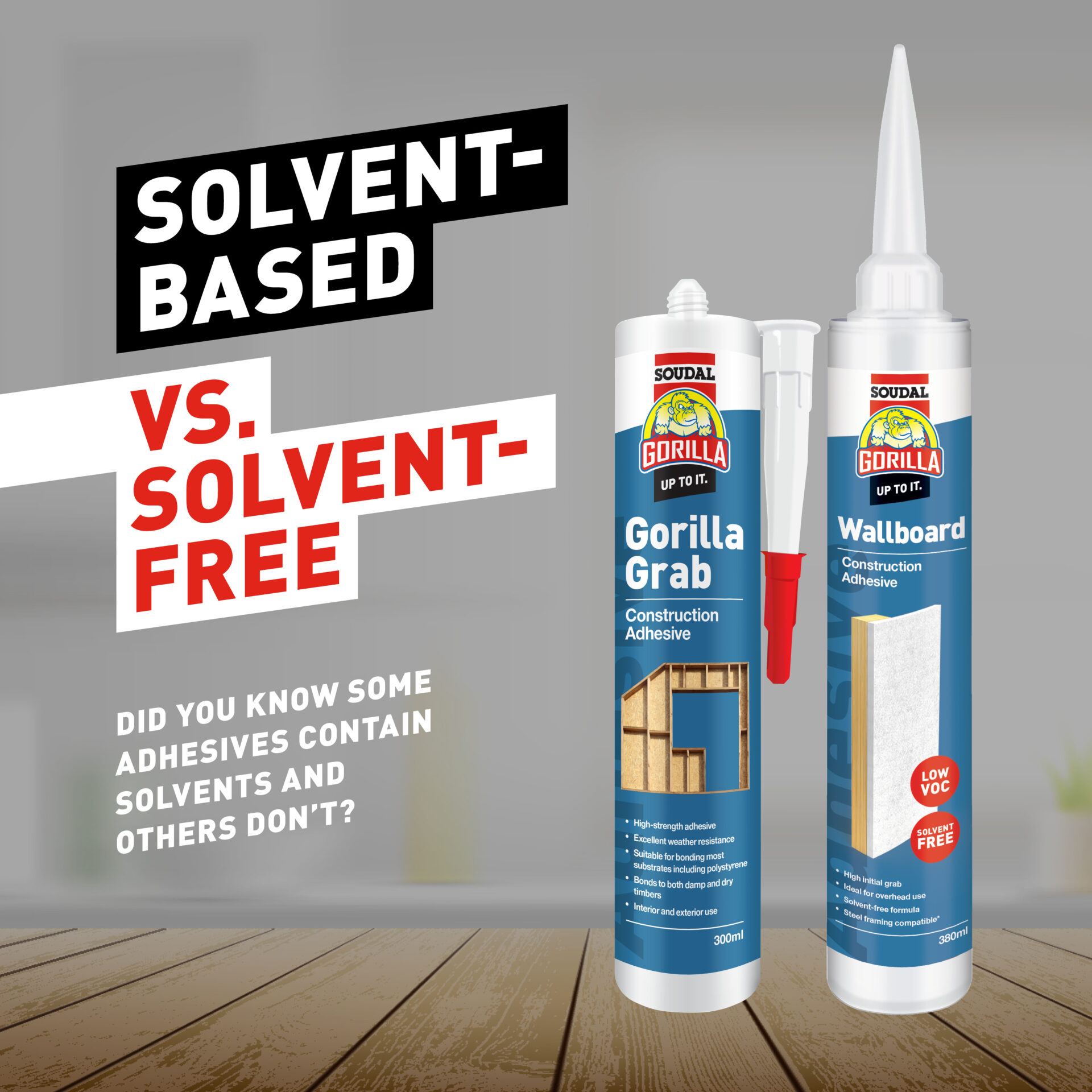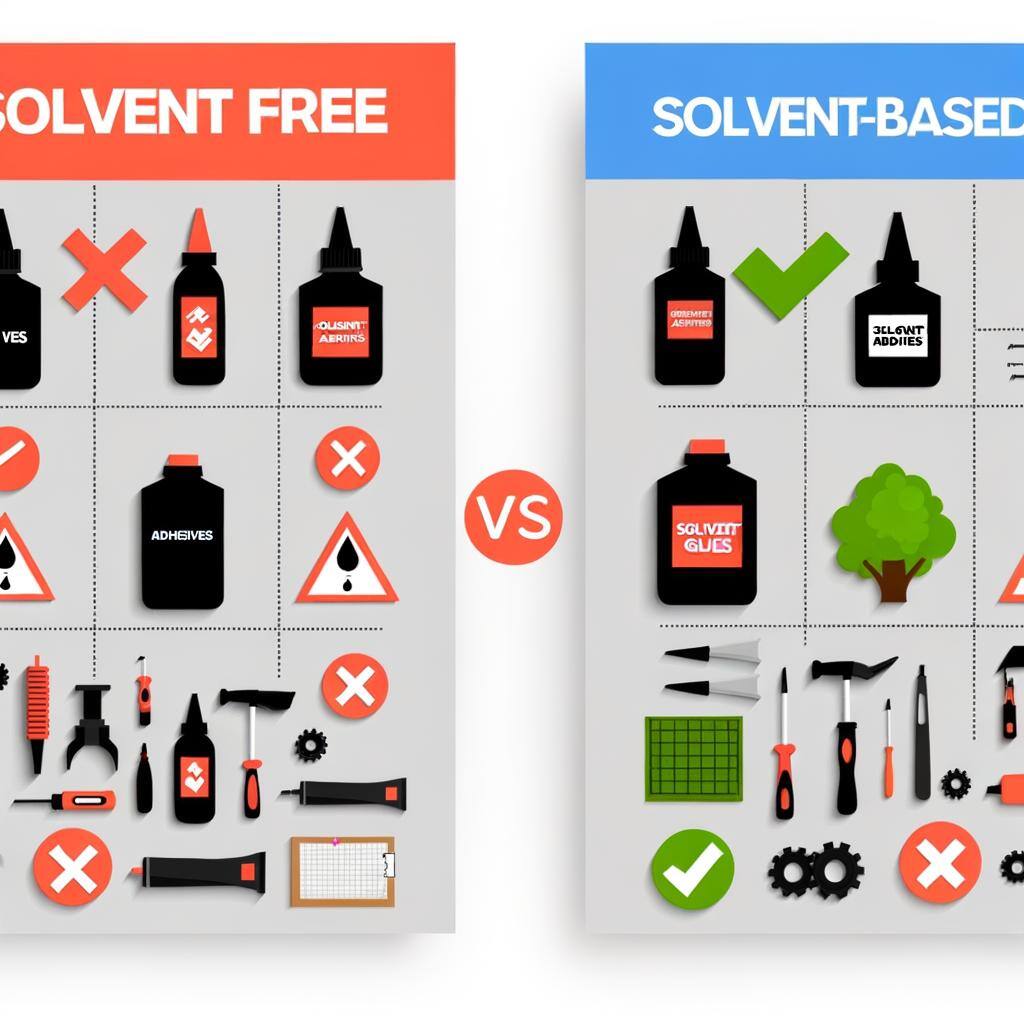Solvent adhesives contain volatile organic compounds, while solvent-free adhesives do not release harmful chemicals. Solvent-based adhesives use organic solvents to disperse the adhesive components, which can be harmful to health and the environment.
On the other hand, solvent-free adhesives are considered more eco-friendly and safer for users due to their low volatile organic compound content. In recent years, there has been a growing trend towards using solvent-free adhesives in various industries as companies prioritize sustainability and safety.
Understanding the differences between solvent and solvent-free adhesives is essential for making informed choices that align with both environmental concerns and health considerations.
Introduction To Adhesives
Adhesives play a crucial role in modern manufacturing processes. They are used to join different materials together and create strong bonds that can withstand various environmental conditions. Adhesives can be categorized into two main types: solvent and solvent-free adhesives.
| Solvent Adhesives | Solvent-Free Adhesives |
|---|---|
| Contain solvents such as toluene or acetone | Do not contain solvents |
| Require proper ventilation during application | Do not require ventilation |
| Can have longer drying times | Dry faster |
| May have stronger bonding properties | May not have as strong bonding properties |
Solvent adhesives are typically used in industries such as automotive, construction, and packaging. Solvent-free adhesives are commonly used in food packaging and medical applications. When selecting an adhesive, it is important to consider the materials being joined, the environmental conditions the bond will be exposed to, and the application process.

Defining Solvent-based Adhesives
Solvent-Based Adhesives are adhesives that use volatile organic compounds (VOCs) as a carrier. These adhesives typically consist of key components such as polymers, solvents, and additives. The properties of solvent-based adhesives include fast drying time, strong bonding strength, and versatility. They are commonly used in industries such as automotive, construction, and packaging.
Exploring Solvent-free Adhesives
Solvent-free adhesives are a popular choice in various industries due to their unique characteristics and benefits. Unlike solvent-based adhesives, which contain volatile organic compounds (VOCs), solvent-free adhesives are formulated without the use of solvents, making them more environmentally friendly and safer to use.
These adhesives come in different types, such as water-based, reactive, and hot melt adhesives. Water-based adhesives are versatile and suitable for various substrates, while reactive adhesives offer excellent bonding strength and durability. Hot melt adhesives, on the other hand, provide fast setting times and high heat resistance.
One of the standout features of solvent-free adhesives is their low odor, which makes them ideal for applications in enclosed spaces or sensitive environments. Additionally, these adhesives offer excellent adhesion to a wide range of materials, including plastics, metals, and wood.
When it comes to sustainability, solvent-free adhesives are a clear winner. They help reduce the emission of harmful chemicals into the environment and contribute to a healthier workplace. Moreover, their non-flammable nature enhances safety during storage and transportation.
In conclusion, solvent-free adhesives provide a safe, efficient, and sustainable solution for various bonding needs. Whether in the automotive, construction, or packaging industry, these adhesives offer excellent performance and environmental benefits.

Comparative Analysis: Performance And Durability
In a comparative analysis of solvent vs. solvent-free adhesive, the focus is on performance and durability. Solvent adhesives offer strong initial bond strength, while solvent-free adhesives are known for their environmental friendliness and long-term durability. The choice between the two depends on specific project requirements and sustainability goals.
| Comparative Analysis: Performance and Durability |
|---|
| Solvent-based adhesives offer high bond strength and are ideal for applications requiring flexibility. However, solvent-free adhesives provide longevity and environmental resistance. While solvent-based adhesives may offer immediate bonding, they can emit harmful volatile organic compounds. On the other hand, solvent-free adhesives are environmentally friendly and have excellent longevity. When it comes to bond strength, solvent-based adhesives generally outperform solvent-free options. Conversely, for environmental resistance and longevity, solvent-free adhesives are the better choice. It’s important to consider the specific requirements of the project when choosing between these two types of adhesives. |
Health And Safety Considerations
When it comes to Health and Safety Considerations, exposure risks are a major concern with solvent-based adhesives. Workers may face inhalation of harmful vapors and skin contact with potentially hazardous chemicals. On the other hand, solvent-free adhesives offer a safer alternative, minimizing health risks and reducing the impact on the environment. These options provide advantages such as improved indoor air quality and lower risk of flammability incidents. Additionally, they contribute to a healthier workplace and promote sustainable practices. Moreover, utilizing solvent-free adhesives aligns with regulatory standards and supports a safer, more responsible approach to adhesive applications.
Environmental Impact
Solvent-based adhesives have a significant environmental impact due to their high VOC emissions and potential harm to air quality. In contrast, solvent-free adhesives offer a more sustainable option with lower emissions, reducing their ecological footprint and promoting a healthier environment.
| Solvent Adhesive | Solvent-Free Adhesive |
| Contains volatile organic compounds (VOCs). | Free from harmful VOC emissions. |
| Impacts air quality and contributes to pollution. | Environmentally friendly with low emissions. |
| Challenging to dispose of due to toxicity. | Easier disposal process with less environmental impact. |
Economic Implications
Solvent-based adhesives have lower upfront costs but can lead to higher expenses due to ventilation and disposal requirements. On the other hand, solvent-free adhesives may have higher initial costs but offer long-term economic benefits through reduced health and environmental impact.
Choosing the right adhesive can have significant economic implications for businesses.
| Economic Implications |
| Cost-Benefit Analysis |
| The choice between solvent and solvent-free adhesives involves considering costs and benefits. |
| Solvent adhesives may have lower upfront costs, but require more ventilation and pose health risks. |
| Solvent-free adhesives tend to be pricier, but offer long-term savings and environmental advantages. |
| Market trends indicate a shift towards eco-friendly and sustainable products. |
Choosing The Right Adhesive For Your Needs
Choosing the right adhesive for your needs can be a challenging task. When comparing solvent-based adhesives to solvent-free adhesives, it’s important to consider factors such as bonding strength, environmental impact, and application requirements. Understanding the differences between the two types will help you make an informed decision for your specific project.
| When it comes to choosing adhesives, it’s crucial to evaluate your application requirements. |
| Solvent-based adhesives offer strong bonding but emit volatile organic compounds. |
| Solvent-free adhesives are eco-friendly and have low odor but may have longer curing times. |
| Testing adhesives on your materials is essential to ensure compatibility and bonding strength. |
| Consider factors like substrate type, environmental conditions, and required bond strength. |
| Select an adhesive that balances performance, environmental impact, and ease of use. |

Frequently Asked Questions
What Is A Solvent Adhesive?
A solvent adhesive is a type of adhesive that contains a solvent, which is a liquid that helps to dissolve the adhesive’s ingredients. Solvent adhesives are commonly used in industries such as construction, automotive, and packaging.
What Is A Solvent-free Adhesive?
A solvent-free adhesive is a type of adhesive that does not contain any solvents. Instead, it uses a different method to bond materials together, such as a chemical reaction or a physical bond. Solvent-free adhesives are often used in industries such as healthcare, food packaging, and electronics.
What Are The Benefits Of Using A Solvent-free Adhesive?
Solvent-free adhesives offer several benefits over solvent adhesives. They are more environmentally friendly, as they do not release harmful solvents into the air. They are also safer for workers to handle, as they do not pose a risk of inhalation.
Additionally, solvent-free adhesives can often provide stronger bonds and better resistance to heat and chemicals.
Are Solvent-free Adhesives More Expensive Than Solvent Adhesives?
Solvent-free adhesives can be more expensive than solvent adhesives, as they often require more complex manufacturing processes and use higher-quality ingredients. However, the long-term benefits of using a solvent-free adhesive, such as improved safety and environmental sustainability, can often outweigh the higher initial cost.
Conclusion
To conclude, when deciding between solvent and solvent-free adhesives, it is crucial to consider the specific requirements of your project. Solvent-based adhesives offer strong bonding capabilities and versatility, but they come with environmental and health concerns. On the other hand, solvent-free adhesives provide a safer and more sustainable option without compromising on performance.
Ultimately, making an informed choice based on your needs and priorities will ensure the success of your adhesive application.

